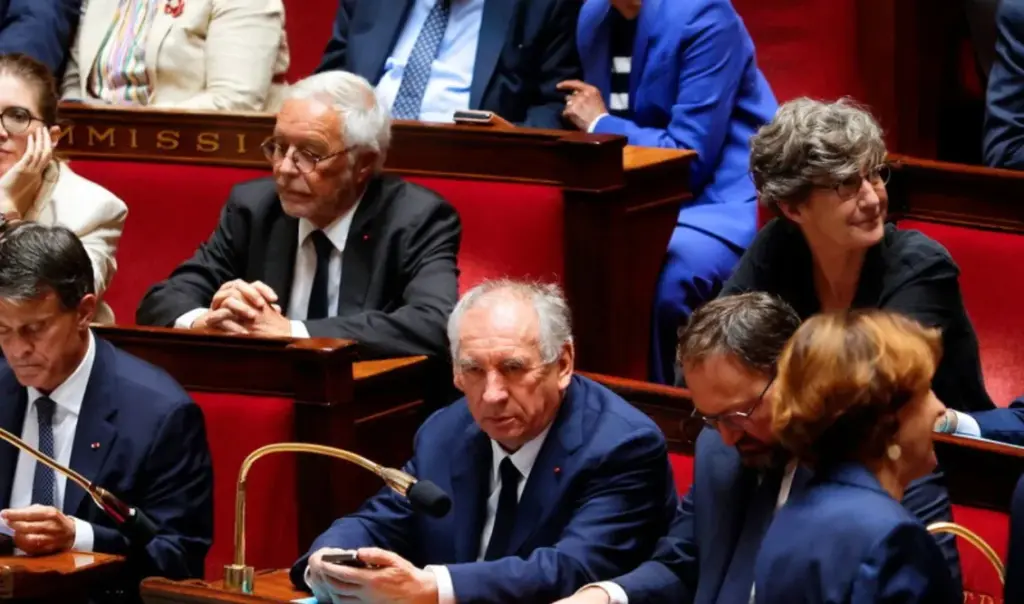France is officially in political turmoil, with the country’s top political process ending as expected but dishonorably for French Prime Minister François Barnier, who lost the confidence vote and consequently his position, with 364 negative votes against 194 positive ones. The negative climate from the majority of opposition parliamentary seats culminated and automatically revealed a deficit of understanding and trust.
France: The development of the no-confidence motion against Barnier
Shortly after 7:30 PM (Greek time) the critical vote began after the pivotal session of the French National Assembly that judged Barnier’s political future, in a process that from the beginning was considered predetermined but also one of the most politically serious moments for France since World War II. “If we don’t address the debt, we won’t be able to borrow at all,” Barnier declared earlier while taking the parliamentary podium to assume responsibility for his government’s austerity budget, which aims to limit the country’s debt, currently at 114% of GDP. He emphasized that he “wanted“ this “moment of truth.” According to French media, Barnier plans to submit his resignation to Emmanuel Macron tomorrow morning.
The response from the 577 deputies during the vote was given tonight. However, there was no suspense: the parliamentary coalition supporting Emmanuel Macron lacks a majority, and opposition parties from the far right to the far left had warned they would vote “no.”
It should be noted that the French Prime Minister himself submitted the motion, following his difficulty in convincing political opponents to support his 2026 budget, which forecasts major cuts worth 44 billion euros. With this move, Barnier aimed to reduce France’s budget deficit from 5.8% of gross domestic product (GDP) in 2024 to 4.6% in 2026. This is a level that remains well above the rules set by the European Union for its members.
Le Pen: Called for Macron to resign
The president of the National Rally, Marine Le Pen, said France needs a “restart“ to “restart the engine that is burdened by errors“ and insisted on Emmanuel Macron’s resignation.
She emphasized that the national assembly faces “a particular political situation,” as “those responsible are forced to confront the catastrophic results“ of decades of mismanagement, the consequences of which will affect future generations.
She noted that “what will remain above all in memory is the unwavering and unwelcome solidarity of former political forces“ responsible for the situation.
Le Pen mentioned that the debate marks “the end of the agony of an imaginary government,” which, as she says, “did not govern but simply administered“ the country.
“But given that this decision depends exclusively on him… I expect nothing at this point,” she noted. Instead, she supports dissolving the assembly and calling early elections, saying this power granted to the president was intended to be “an institutional means to overcome the deadlock.”
“Everything indicates that from a legal, political, even moral perspective, dissolution is not an option but an obligation,” she argues.
She claims the government’s continued paralysis could transform into a broader crisis.
Le Pen closed her speech saying the government “should not expect the National Rally to follow it in its madness regarding fiscal policy and immigration.”
“If our people honor us with a clear mandate… We will implement, without waiting for the presidential elections, a national recovery program for changes that cannot wait any longer,” she concluded.
François Barnier: You have the power to overthrow the government, but you don’t have the power to erase reality
French Prime Minister François Barnier spoke of a “moment of truth“ regarding the urgent need to reduce public debt, in the speech that opened today’s critical session of the French National Assembly which will close with a confidence vote expected to lead to the government’s overthrow and plunge France back into political crisis.
“This moment of truth as head of government (…) is something I wanted,” Barnier declared before the National Assembly, arguing that the country’s survival is “at stake“ due to its “over-indebtedness“ (114% of GDP).
“Our country works, thinks it’s getting richer and every year gets poorer. It’s a silent, underground, invisible and unbearable hemorrhage,” he said in the speech that was interrupted by insults shouted by opposition party deputies.
“You have the power to overthrow the government, but you don’t have the power to erase reality,” Barnier warned, comparing “submission to debt“ with “submission to military force,” depriving people of their freedoms.
“I speak to you taking literally our principles, principles defined in Article 27 of the Constitution: “The voting right of Parliament members is personal,” Barnier declared. “This means that, in principle, slogans have no place here. What has place here is the personal conscience of each member of the nation’s parliament,” Barnier emphasized.
Republicans exclude cooperation with the left
With criticism directed toward the left as well as Prime Minister François Barnier, the president of the Republicans’ (LR) parliamentary group, Laurent Wauquiez, combined his positioning in the National Assembly.
Starting his speech, he expressed “his sadness“ about the country’s course, noting that “France is on the road to instability.” As he emphasized, “political instability is economic poison.”
Directing his arrows toward Jean-Luc Mélenchon, he accused the leader of France Unbowed of “waiting only for chaos“ and assured that the Republicans would not participate in any government with radical left officials or in a government implementing the New Popular Front program. “Even if the prime minister comes from the most moderate leftists, the Socialists, we will not participate,” he clarified.
At the same time, he didn’t fail to attack Prime Minister Barnier, speaking of “hidden tax increases.” “If you had listened to the voices of working France, you would have had the full support of LR deputies,” he noted, emphasizing that many on the right will vote against the confidence vote or choose abstention. “The voices of working France have not been heard,” he added.
Despite his criticism, Wauquiez emphasized that the country needs stability and “compromises.” He called for political figures who don’t necessarily share the same views to sit at the same table and agree on a common work program.
Concluding, he proposed the model of a future prime minister who would first present his program and then political forces “would decide, with their heart and mind, whether to support him, participate in his government or criticize him.”
Tondelier against Barnier
In France’s political scene, Marine Tondelier, head of the Green party, appeared particularly critical of François Barnier’s intervention in the National Assembly.
With a post on platform X, Tondelier spoke of a “weak finale,” noting that the prime minister’s speech was “shorter than expected,” something that, as she said, gave the impression he “wasn’t even trying to convince anyone.”
Her stance demonstrates the Greens’ reservations about the governmental attempt to secure a confidence vote at a critical political turning point for France.
Harsh criticism from Socialists: Macron impoverished the poor
Opening the round of parliamentary group statements, Boris Vallaud emphasized that today’s session is a process “that the Socialists neither desired nor organized,” launching a fierce attack against both François Barnier and President Emmanuel Macron, whom he called a “defeated president“ responsible for the current crisis.
“Do you like the truth? Here it is then,” he said, accusing Macron of “impoverishing the poor, enriching the rich and turning his back on the future.” According to him, Barnier’s decision to call for a confidence vote constitutes not “an act of courage but an escape“ and an attempt to avoid responsibility for the current crisis.</p




